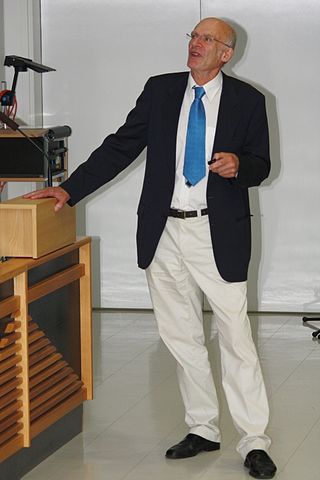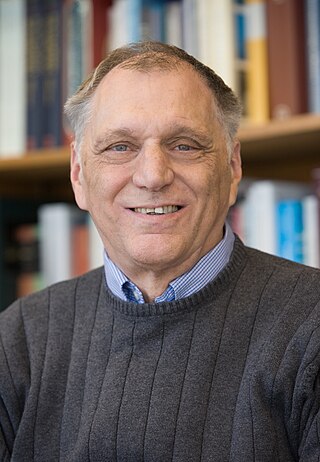
Daydreaming is the stream of consciousness that detaches from current, external tasks when attention drifts to a more personal and internal direction. This phenomenon is common in people's daily life shown by a large-scale study in which participants spend 47% of their waking time on average on daydreaming. There are various names of this phenomenon including mind wandering, fantasy, spontaneous thoughts, etc. Daydreaming is the term used by Jerome L. Singer whose research laid the foundation for nearly all the subsequent research today. The terminologies assigned by researchers today puts challenges on identifying the common features of daydreaming, and on building collective work among researchers.

James Lloyd "Jay" McClelland, FBA is the Lucie Stern Professor at Stanford University, where he was formerly the chair of the Psychology Department. He is best known for his work on statistical learning and Parallel Distributed Processing, applying connectionist models to explain cognitive phenomena such as spoken word recognition and visual word recognition. McClelland is to a large extent responsible for the large increase in scientific interest in connectionism in the 1980s.
The cognitive revolution was an intellectual movement that began in the 1950s as an interdisciplinary study of the mind and its processes. It later became known collectively as cognitive science. The relevant areas of interchange were between the fields of psychology, linguistics, computer science, anthropology, neuroscience, and philosophy. The approaches used were developed within the then-nascent fields of artificial intelligence, computer science, and neuroscience. In the 1960s, the Harvard Center for Cognitive Studies and the Center for Human Information Processing at the University of California, San Diego were influential in developing the academic study of cognitive science. By the early 1970s, the cognitive movement had surpassed behaviorism as a psychological paradigm. Furthermore, by the early 1980s the cognitive approach had become the dominant line of research inquiry across most branches in the field of psychology.
William Hirstein is an American philosopher primarily interested in philosophy of mind, philosophy of language, metaphysics, cognitive science, and analytic philosophy. He is a professor of philosophy at Elmhurst University.

Lisa Feldman Barrett is a University Distinguished Professor of psychology at Northeastern University, where she focuses on affective science. She is a director of the Interdisciplinary Affective Science Laboratory. Along with James Russell, she is the founding editor-in-chief of the journal Emotion Review. Along with James Gross, she founded the Society for Affective Science.

Risto Kalervo Näätänen is a psychological scientist, pioneer in the field of cognitive neuroscience, and known worldwide as one of the discoverers of the electrophysiological mismatch negativity. He has been a much-cited social scientist and one of the few individuals appointed permanent Academy Professor of the Academy of Finland. He retired in 2007, retaining a title of Academy Professor emeritus of the Academy of Finland. Since 2007, he has been a professor at the University of Tartu.
Mind-wandering is a broad term with no currently universal definition. According to McMillan, Kaufmann and Singer (2013) mind-wandering consists of 3 different subtypes: positive constructive daydreaming, guilty fear of failure, and poor attentional control. Whereas Smallwood and Schooler (2015) suggest that mind-wandering consists of thoughts that are task-unrelated and stimulus-independent. In general, a folk explanation of mind-wandering could be described as the experience of thoughts not remaining on a single topic for a long period of time, particularly when people are engaged in an attention-demanding task.

Peter Carruthers is a British-American philosopher and cognitive scientist working primarily in the area of philosophy of mind, though he has also made contributions to philosophy of language and ethics. He is a professor of philosophy at the University of Maryland, College Park, an associate member of Neuroscience and Cognitive Science Program, and a member of the Committee for Philosophy and the Sciences.

John Terrence Cacioppo was the Tiffany and Margaret Blake Distinguished Service Professor at the University of Chicago. He founded the University of Chicago Center for Cognitive and Social Neuroscience and was the director of the Arete Initiative of the Office of the Vice President for Research and National Laboratories at the University of Chicago. He co-founded the field of social neuroscience and was member of the department of psychology, department of psychiatry and behavioral neuroscience, and the college until his death in March 2018.

The Princeton University Department of Psychology, located in Peretsman-Scully Hall, is an academic department of Princeton University in Princeton, New Jersey. For over a century, the department has been one of the most notable psychology departments in the country. It has been home to psychologists who have made well-known scientific discoveries in the fields of psychology and neuroscience.

Helen J. Neville was a Canadian psychologist and neuroscientist known internationally for her research in the field of human brain development.

Larry Ryan Squire is a professor of psychiatry, neurosciences, and psychology at the University of California, San Diego, and a Senior Research Career Scientist at the Veterans Affairs Medical Center, San Diego. He is a leading investigator of the neurological bases of memory, which he studies using animal models and human patients with memory impairment.

Some of the research that is conducted in the field of psychology is more "fundamental" than the research conducted in the applied psychological disciplines, and does not necessarily have a direct application. The subdisciplines within psychology that can be thought to reflect a basic-science orientation include biological psychology, cognitive psychology, neuropsychology, and so on. Research in these subdisciplines is characterized by methodological rigor. The concern of psychology as a basic science is in understanding the laws and processes that underlie behavior, cognition, and emotion. Psychology as a basic science provides a foundation for applied psychology. Applied psychology, by contrast, involves the application of psychological principles and theories yielded up by the basic psychological sciences; these applications are aimed at overcoming problems or promoting well-being in areas such as mental and physical health and education.
Ian Robertson is a Scottish neuroscientist and clinical psychologist, and Professor of Psychology at Trinity College Dublin. He is also known as a leading researcher as to how an individual may harness the attention system of one's mind to enhance autonomy over emotions and cognitive function.
Michael Charles Corballis was a New Zealand and Canadian psychologist and author. He was Emeritus Professor at the Department of Psychology at the University of Auckland. His fields of research were cognitive psychology and cognitive neuroscience, encompassing visual perception, visual imagery, attention, memory, and the evolution of language.

Francesca Gabrielle Elizabeth Happé is Professor of Cognitive Neuroscience and Director of the MRC Social, Genetic and Developmental Psychiatry Centre at the Institute of Psychiatry, Psychology and Neuroscience, King's College London. Her research concerns autism spectrum conditions, specifically the understanding social cognitive processes in these conditions.

Jonathan Schooler, is an American psychologist and Distinguished Professor of Psychological and Brain Sciences at the University of California, Santa Barbara, who researches various topics that intersect aspects of both cognitive psychology and philosophy such as: Belief in free will, Meta-awareness, Mindfulness, Mind-Wandering, Memory, Creativity, and Emotion. Schooler is also known for his sometimes controversial research on topics such as Anomalous Cognition and the decline effect.
Helen Tager-Flusberg is an American psychology who is professor in the Department of Psychological and Brain Science at Boston University and the Departments of Anatomy and Neurobiology and Pediatrics at Boston University School of Medicine (BUSM). She is the Director of the Center for Autism Research Excellence at Boston University.

The Princeton Neuroscience Institute (PNI) is a center for neuroscience research at Princeton University. Founded in the spring of 2004, the PNI serves as a "stimulus for teaching and research in neuroscience and related fields" and "places particular emphasis on the close connection between theory, modeling, and experimentation using the most advanced technologies." It often partners with Princeton University's departments of Psychology and Molecular Biology.
Jonathan David Cohen is an American psychologist and cognitive neuroscientist. He is the Robert Bendheim and Lynn Bendheim Thoman Professor in Neuroscience and Professor of Psychology at Princeton University, where he is also the founding co-director of the Princeton Neuroscience Institute. He originally joined the faculty of Princeton in 1998, and became the founding director of the Center for the Study of Brain, Mind, and Behavior in 2000. A noted expert on neuroimaging, he played a major role in increasing the use of fMRI scanners in scientific research. He has been a fellow of the Association for Psychological Science since 2007 and of the American Association for the Advancement of Science since 2012. He is a recipient of the Joseph Zubin Memorial Fund Award, the APA Award for Distinguished Scientific Contributions to Psychology, and the Association for Psychological Science's William James Fellow Award.












